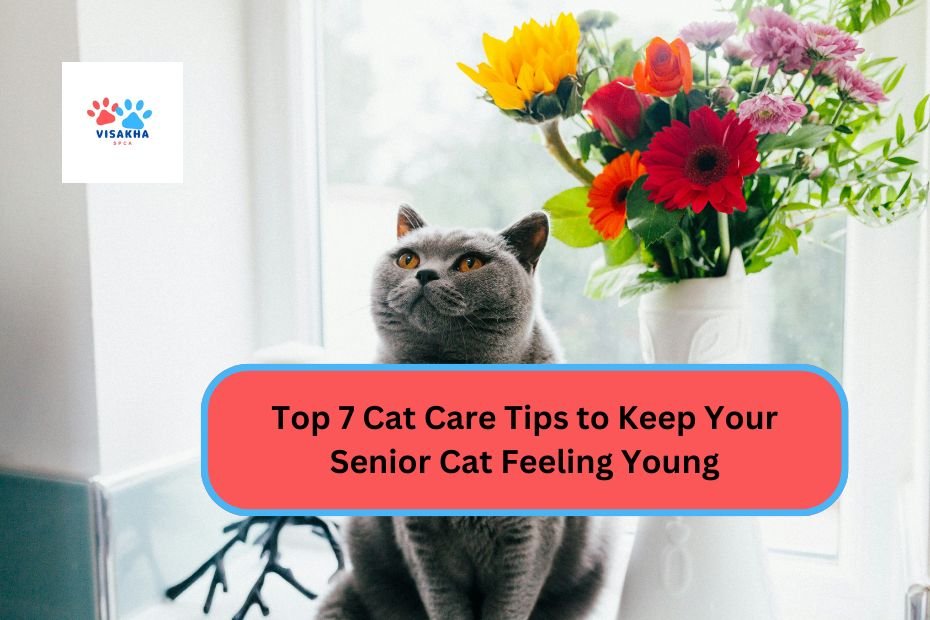As our beloved cats age, they often face various health challenges and lifestyle changes. However, with the right care and attention, you can help your senior cat maintain its youthful spirit and vitality. Here are seven essential cat care tips that will keep your aging feline feeling young and vibrant.
1. Regular Vet Check-Ups
Why It Matters
Regular veterinary visits are crucial for monitoring your senior cat’s health. Routine check-ups can help identify potential health issues before they become serious.
Tips
- Schedule vet visits at least once or twice a year.
- Discuss any changes in behavior, appetite, or weight with your veterinarian.
- Ensure your cat is up-to-date on vaccinations and preventive care, including dental cleanings and parasite control.
2. Adjust Their Diet
Why It Matters
Aging cats often have different nutritional needs than younger cats. A proper diet can help maintain their health and manage weight, which is essential for preventing obesity-related issues.
Tips
- Opt for high-quality, age-appropriate cat food that is rich in protein and low in carbohydrates.
- Look for formulas specifically designed for senior cats, as they may contain additional nutrients to support joint health and cognitive function.
- Monitor your cat’s weight and adjust portion sizes accordingly to prevent obesity.
3. Encourage Gentle Exercise
Why It Matters
Regular physical activity is essential for maintaining your cat’s muscle tone and joint flexibility. While senior cats may not be as active, gentle exercise can keep them fit and mentally stimulated.
Tips
- Engage your cat with interactive toys, such as feather wands or laser pointers, to encourage play without overexertion.
- Create safe spaces for climbing and exploring, such as cat trees or shelves, to promote light activity.
- Consider short, frequent play sessions rather than prolonged periods to avoid fatigue.
4. Provide Comfortable Resting Areas
Why It Matters
Senior cats often require more rest and comfort than their younger counterparts. Providing cozy spots can help them feel secure and relaxed.
Tips
- Create soft, warm resting areas in quiet locations around your home.
- Use orthopedic cat beds or heated blankets to support aging joints.
- Ensure that your cat can easily access their favorite resting spots without jumping too high.
5. Maintain Good Hydration
Why It Matters
Hydration is vital for overall health, especially for senior cats, who may be more prone to kidney issues. Proper hydration supports organ function and digestion.
Tips
- Ensure your cat has access to fresh, clean water at all times.
- Consider using a cat water fountain, which can encourage your cat to drink more.
- Incorporate wet food into their diet to boost hydration, as it contains more moisture than dry kibble.
6. Focus on Dental Health
Why It Matters
Dental health is crucial for senior cats, as dental disease can lead to more severe health problems. Good oral hygiene can enhance their quality of life.
Tips
- Brush your cat’s teeth regularly with toothpaste formulated for cats.
- Provide dental treats or toys designed to promote oral health.
- Schedule professional dental cleanings as recommended by your veterinarian.
7. Monitor Their Behavior and Adjust Care
Why It Matters
Behavioral changes can indicate health issues or discomfort in senior cats. Staying attuned to their needs helps you provide the best care possible.
Tips
- Keep a close eye on your cat’s grooming habits, litter box usage, and social interactions.
- Be aware of any signs of pain, such as limping, hiding, or changes in appetite.
- Consult your veterinarian if you notice significant behavioral changes, as early intervention can lead to better outcomes.
Conclusion
Caring for a senior cat requires a bit more attention and understanding, but the rewards are immeasurable. By following these tips, you can help your aging feline friend maintain its health and vitality, ensuring they feel young at heart for years to come. Regular vet visits, a balanced diet, gentle exercise, and a focus on comfort and hydration are essential to promoting your cat’s overall well-being. Remember, your senior cat may need extra love and care, but with your support, they can continue to enjoy life to the fullest!

